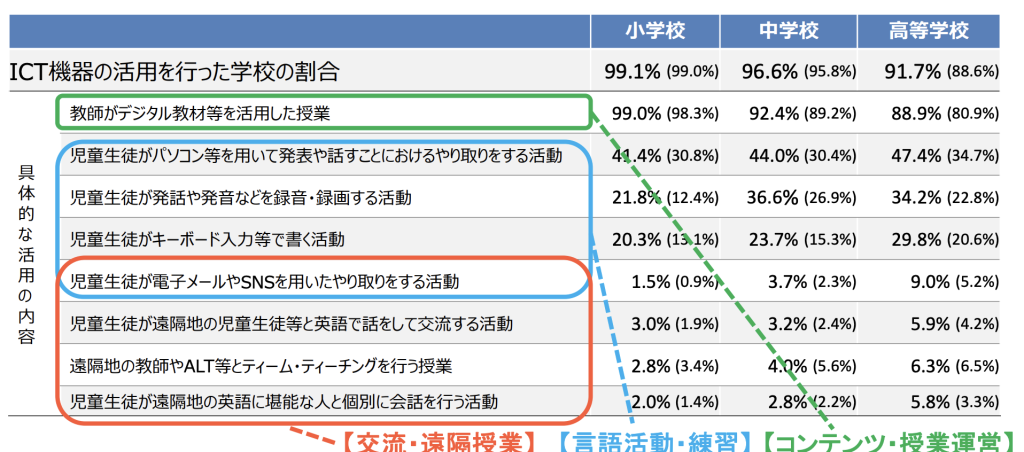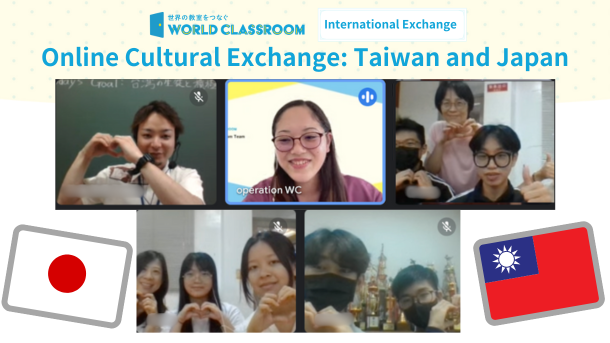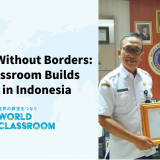Hello, everyone!
We are the WorldClassroom team of HelloWorld Inc.
On May 22, 2024, an online international exchange class using WorldClassroom was held between Aguni Junior High School in Aguni Village on a remote island in Okinawa and National Suao Marine and Fisheries Vocational High School in Taiwan.
This was the second international exchange for the students of Aguni Junior High School since last year. Last year, they had an international exchange with Laos 🇱🇦, and this year they had an international exchange with Taiwan 🇹🇼. WorldClassroom provides an opportunity for children who are not used to interacting with people from other countries to interact with students of their own age from other countries in the classroom.
The students at Aguni Junior High School were eager to speak more this year based on their experience last year! This was evident in their enthusiasm as they engaged in active conversation from the beginning of the session. The continuous international exchange seems to be a good motivation for students to learn English.
During the program, students were divided into small groups and began by introducing themselves to each other. Many students were active communicators from the beginning, actively using English to communicate with each other.
Students talked about famous sightseeing spots, food, and anime.
One group of students from Aguni Junior High School had prepared in advance photos of Shurijo Castle, a World Heritage Site in Okinawa, and introduced the tourist attraction and its history. In contrast, Taiwanese students introduced famous Taiwanese beverages.
In addition, many Taiwanese students seemed to have learned Japanese from Japanese anime, and they taught each other about each other’s language. At the end of the program, it was very impressive to see them saying “Thank you” and “Bye-bye” to each other in their own languages as they said goodbye to each other.
It was a great opportunity for the students to learn about different cultures and customs, and it seemed to be a good opportunity for intercultural understanding. Thanks to the photos they had prepared in advance, the conversation was lively and they seemed to be actively asking each other questions.


During program, students respond to each other’s responses in English, such as “Really?”,”What’s that?”, “That’s nice!”, etc., to keep the conversation going smoothly. In addition, students will have many opportunities to answer questions from the other country, which will help them improve their practical English skills.
Even when communication in English does not go as smoothly as expected, students will use symbols, gestures, and other non-verbal communication to convey their feelings, and many other ways to learn skills on the spot. We also share useful materials for conversations with the schools in advance, so that students can use these materials to further their conversations during the session if they encounter any difficulties. Through this program, the students learned many skills other than English, such as new perspectives, communication skills, and intercultural understanding.

“The Use of ICT in the Teaching of Foreign Languages”
According to an analysis by the Ministry of Education, Culture, Sports, Science and Technology (MEXT), nearly 90% of school teachers use digital textbooks in their classes, while only 36.6% of junior high school students and 34.2% of high school students record their speech and/or pronunciation in English. In addition, only 3.2% of junior high school students and 5.9% of high school students engage in “activities in which students speak and interact in English with students in remote areas.
The WorldClassroom app includes a reading function and a presentation function. In addition to speaking practice, students can record and submit assignments to their teachers. Teachers can visualize the results of their students’ practice and the scores in a list, which can be reflected in their grades. By replacing the content of English instruction to students that teachers have had to deal with in the past, WorldClassroom is expected to reduce the burden of teachers.
The shortage of teachers is becoming more and more serious every year, and the workload of teachers is heavy, especially on remote islands where, in addition to the shortage of staff, there are few opportunities for international exchange, We provide international exchange with schools overseas.
WorldClassroom aims to “change the classroom, expand the world, and reduce the burden on the educational field,” and we will continue to work hard to provide even better services. Our goal is to inspire children to become interested in English learning and international exchange through their experiences in English classes at school.
What is WorldClassroom?
It is an online cross-cultural exchange & English education platform that is widely used in public schools in Japan and schools abroad. We aim to encourage students’ language acquisition and international cultural exchange through the use of technology, while at the same time reducing teacher’s burdens by using an automated evaluation system.
WorldClassroom enables students to use English as a lingua franca in today’s world! Why don’t you provide great, real-life English learning opportunities for your students through online cross-cultural exchange, which they cannot experience just by sitting in front of their desks?
We look forward to hearing from you!
To contact us, please click here.


